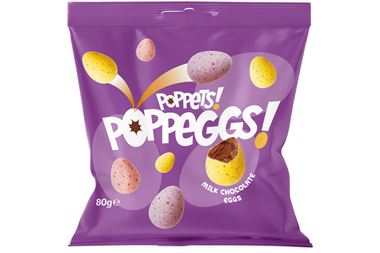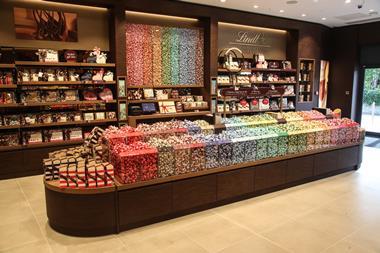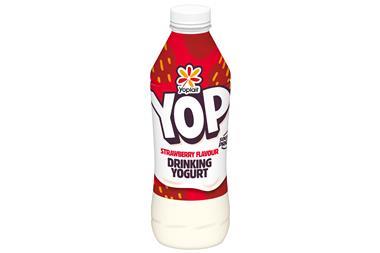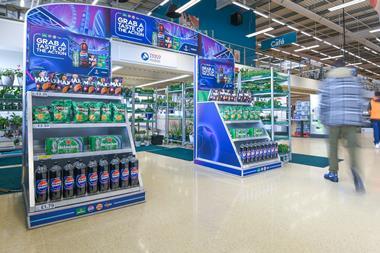Leaked figures show sales at Somerfield stores converted to the The Co-operative fascia have plummeted. Beth Phillips takes a look at the wider picture
Got a leak? Call a plumber. If only it were that simple for The Co-operative Group, which this week was left mopping up after confidential sales data on its Somerfield stores was leaked to the press.
The data, which was also sent to The Grocer, accompanied by a letter claiming customers were "deserting in droves", makes for grim reading. Dating back to a 20 April board meeting and coming just a month after CEO Peter Marks insisted sales in rebranded stores were up 12% year-on-year in 2009, it reveals that like-for-like sales in former Somerfield stores converted to the society's The Co-operative fascia were actually down 12.2% year-on-year and 14.1% in February alone.
Sales in stores still trading under the Somerfield fascia fared little better down 11% year-on-year and 13.3% in February. And although The Co-op stores posted a 4.1% like-for-like sales increase over the year, overall combined sales were down 1.8%. So how does Marks account for the discrepancies?
Speaking exclusively to The Grocer, he insists the decline is a temporary blip in an integration that is still a year from completion and has so far run successfully.
The 12% rise in year-on-year sales he'd referred to reflected the performance of rebranded core Co-op stores, he says by way of clarification, not converted Somerfield stores. As for the leaked data suggesting sales in February were down £24.7m on budget, this was indeed the case, but these figures were based on forecasts presented to the board more than six months ago, at a time when the first green shoots of economic recovery were showing.
"It was a very ambitious budget set six months ago, but it was not crucial that we met those targets," he insists. "I think we were too optimistic. The targets we put to the board are always a stretch because we like a challenge, but I think this time it was a stretch too far."
Given that the society is still in the process of integrating 650 Somerfield stores into its business and was only recently released from the jaws of recession it should perhaps have set more realistic targets. But the benefit of hindsight is a wonderful thing and Marks remains bullish about the group's prospects.
"We are very confident about where we are and where we are going," he says. "We're bang on track with the business plan we put to the board. It's always a tough challenge, but we always leave some headroom."
The society is no stranger to integration projects. Since July 2007 it has merged with United Co-op, Lothian Borders and Angus Co-op, Plymouth & South West Co-op and Britannia Building Society.
"We've integrated two massive businesses in the past few years," Marks says. "To give you an example of the complexity of Somerfield, we've got 14 workstreams, 30,000 pieces of IT equipment and 900 store processes that all need to be changed."
Past integrations have taught Marks that if you're going to make changes to a store fascia, you've got to make them quickly. "You can't delay. You have to do it with pace. If, for example, you introduce Co-op products into a store, you can confuse shoppers if they're in there for a long time before the fascia changes."
Suggestions the group was having similar problems to Morrisons when it acquired Safeway, "could not be further from the truth", he claims. "Morrisons was issuing profit warning after profit warning, but only a month ago we announced a massive profit increase on last year. We are absolutely light years from where Morrisons was."
Like-for like-sales across the business as a whole were up 5.5% in the year to January, the group revealed last month. Marks is also taking heart from the fact that sales in Co-op stores remain positive.
"The core Co-op estate is ahead of the market and we have reported 17 quarters of like-for-like growth. So what we are doing is right. We now have to do the same in Somerfield."
Although Marks admits the disposal of Somerfield stores and the strategy of lowering prices have hit sales, managing change has been the biggest challenge, he says.
"We have had to change the Somerfield business model dramatically. It was very different, run by private equity and for the short term. Ours is for the long term. Of course in the short term as we change the model we're going to lose customers. But in the long term, as we grow our core estate, which is still ahead of the market, then we'll attract the shoppers back again."
Such seismic changes haven't gone down well with everyone at The Co-op Group as the leak demonstrated, and one senior insider is still fuming at the way the group's recent performance has been communicated.
"At the end of the day we are accountable to our members," the insider says. "The fact is that Somerfield is not performing according to expectations. If Peter had come out and said that, that would have been fine, but for Peter to say sales were 12% up in rebranded stores, I was stunned. We are around 12% down. That's the honest response and the Co-op response should have been yes, we've taken on stores, it's a difficult culture, which is currently not responding to the Co-op, but we will keep working at it."
Aside from offering an explanation for the conflicting figures, Marks refuses to comment on the letter's claims although he says a degree of resistance is inevitable when any business goes through a period of upheaval. "When you make changes in a business you're bound to ruffle a few feathers," he says. "The board are absolutely committed to me, the team and the progress we're making."
The fact others are experiencing a post-Somerfield hangover will be of some comfort to Marks. The Co-op Group made more than 250 divestments to a number of retailers, including independents, which, one senior retail source claims, have taken even bigger hits.
"My understanding is that independents projected for a sales decline of up to 25% in their business plans as customers get used to change," the source says. "Certain stores are vastly exceeding expectations, but others are trading at lower levels. They previously traded as strong brands with good customer loyalty and it takes time and effort to get customers used to change."
Sales may be down in Somerfield stores, but Marks maintains The Co-op Group is already exploiting its newly increased buying powers to deliver reduced prices. The society's Bank Holiday offers, which included a one-off special buy on a 15-pack of Tuborg lager for £8 and a meatballs and pasta offer that feeds four people for £4, would seem to back up his claims.
The reality, however, it that it will take time to turn Somerfield into a Co-op success story, says Marks. "I'm not predicting a massive uplift in sales," he says. "It is tough at the moment and I think it will be tough all year."
Got a leak? Call a plumber. If only it were that simple for The Co-operative Group, which this week was left mopping up after confidential sales data on its Somerfield stores was leaked to the press.
The data, which was also sent to The Grocer, accompanied by a letter claiming customers were "deserting in droves", makes for grim reading. Dating back to a 20 April board meeting and coming just a month after CEO Peter Marks insisted sales in rebranded stores were up 12% year-on-year in 2009, it reveals that like-for-like sales in former Somerfield stores converted to the society's The Co-operative fascia were actually down 12.2% year-on-year and 14.1% in February alone.
Sales in stores still trading under the Somerfield fascia fared little better down 11% year-on-year and 13.3% in February. And although The Co-op stores posted a 4.1% like-for-like sales increase over the year, overall combined sales were down 1.8%. So how does Marks account for the discrepancies?
Speaking exclusively to The Grocer, he insists the decline is a temporary blip in an integration that is still a year from completion and has so far run successfully.
The 12% rise in year-on-year sales he'd referred to reflected the performance of rebranded core Co-op stores, he says by way of clarification, not converted Somerfield stores. As for the leaked data suggesting sales in February were down £24.7m on budget, this was indeed the case, but these figures were based on forecasts presented to the board more than six months ago, at a time when the first green shoots of economic recovery were showing.
"It was a very ambitious budget set six months ago, but it was not crucial that we met those targets," he insists. "I think we were too optimistic. The targets we put to the board are always a stretch because we like a challenge, but I think this time it was a stretch too far."
Given that the society is still in the process of integrating 650 Somerfield stores into its business and was only recently released from the jaws of recession it should perhaps have set more realistic targets. But the benefit of hindsight is a wonderful thing and Marks remains bullish about the group's prospects.
"We are very confident about where we are and where we are going," he says. "We're bang on track with the business plan we put to the board. It's always a tough challenge, but we always leave some headroom."
The society is no stranger to integration projects. Since July 2007 it has merged with United Co-op, Lothian Borders and Angus Co-op, Plymouth & South West Co-op and Britannia Building Society.
"We've integrated two massive businesses in the past few years," Marks says. "To give you an example of the complexity of Somerfield, we've got 14 workstreams, 30,000 pieces of IT equipment and 900 store processes that all need to be changed."
Past integrations have taught Marks that if you're going to make changes to a store fascia, you've got to make them quickly. "You can't delay. You have to do it with pace. If, for example, you introduce Co-op products into a store, you can confuse shoppers if they're in there for a long time before the fascia changes."
Suggestions the group was having similar problems to Morrisons when it acquired Safeway, "could not be further from the truth", he claims. "Morrisons was issuing profit warning after profit warning, but only a month ago we announced a massive profit increase on last year. We are absolutely light years from where Morrisons was."
Like-for like-sales across the business as a whole were up 5.5% in the year to January, the group revealed last month. Marks is also taking heart from the fact that sales in Co-op stores remain positive.
"The core Co-op estate is ahead of the market and we have reported 17 quarters of like-for-like growth. So what we are doing is right. We now have to do the same in Somerfield."
Although Marks admits the disposal of Somerfield stores and the strategy of lowering prices have hit sales, managing change has been the biggest challenge, he says.
"We have had to change the Somerfield business model dramatically. It was very different, run by private equity and for the short term. Ours is for the long term. Of course in the short term as we change the model we're going to lose customers. But in the long term, as we grow our core estate, which is still ahead of the market, then we'll attract the shoppers back again."
Such seismic changes haven't gone down well with everyone at The Co-op Group as the leak demonstrated, and one senior insider is still fuming at the way the group's recent performance has been communicated.
"At the end of the day we are accountable to our members," the insider says. "The fact is that Somerfield is not performing according to expectations. If Peter had come out and said that, that would have been fine, but for Peter to say sales were 12% up in rebranded stores, I was stunned. We are around 12% down. That's the honest response and the Co-op response should have been yes, we've taken on stores, it's a difficult culture, which is currently not responding to the Co-op, but we will keep working at it."
Aside from offering an explanation for the conflicting figures, Marks refuses to comment on the letter's claims although he says a degree of resistance is inevitable when any business goes through a period of upheaval. "When you make changes in a business you're bound to ruffle a few feathers," he says. "The board are absolutely committed to me, the team and the progress we're making."
The fact others are experiencing a post-Somerfield hangover will be of some comfort to Marks. The Co-op Group made more than 250 divestments to a number of retailers, including independents, which, one senior retail source claims, have taken even bigger hits.
"My understanding is that independents projected for a sales decline of up to 25% in their business plans as customers get used to change," the source says. "Certain stores are vastly exceeding expectations, but others are trading at lower levels. They previously traded as strong brands with good customer loyalty and it takes time and effort to get customers used to change."
Sales may be down in Somerfield stores, but Marks maintains The Co-op Group is already exploiting its newly increased buying powers to deliver reduced prices. The society's Bank Holiday offers, which included a one-off special buy on a 15-pack of Tuborg lager for £8 and a meatballs and pasta offer that feeds four people for £4, would seem to back up his claims.
The reality, however, it that it will take time to turn Somerfield into a Co-op success story, says Marks. "I'm not predicting a massive uplift in sales," he says. "It is tough at the moment and I think it will be tough all year."

















No comments yet